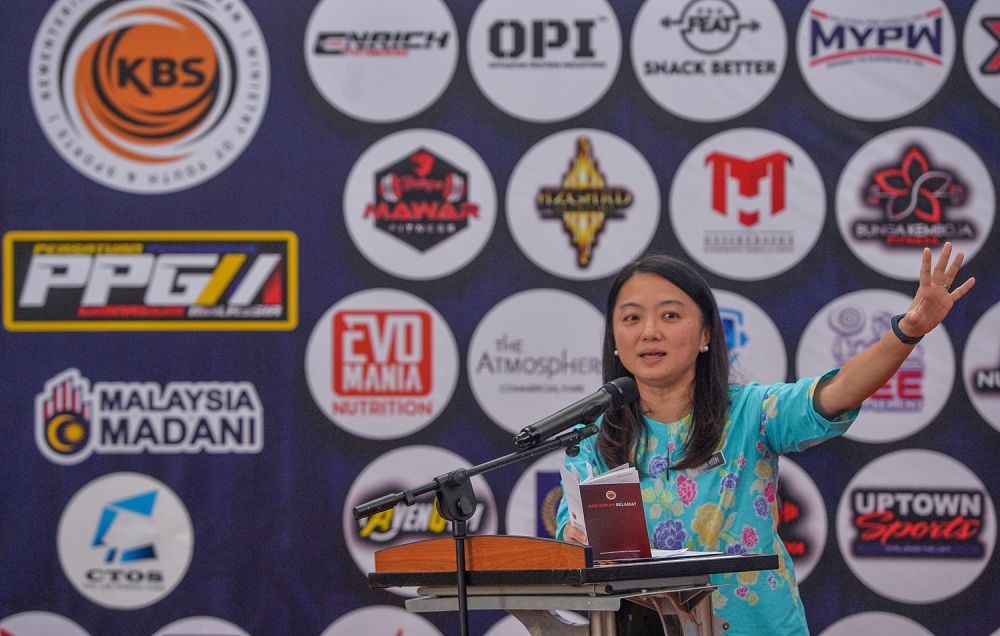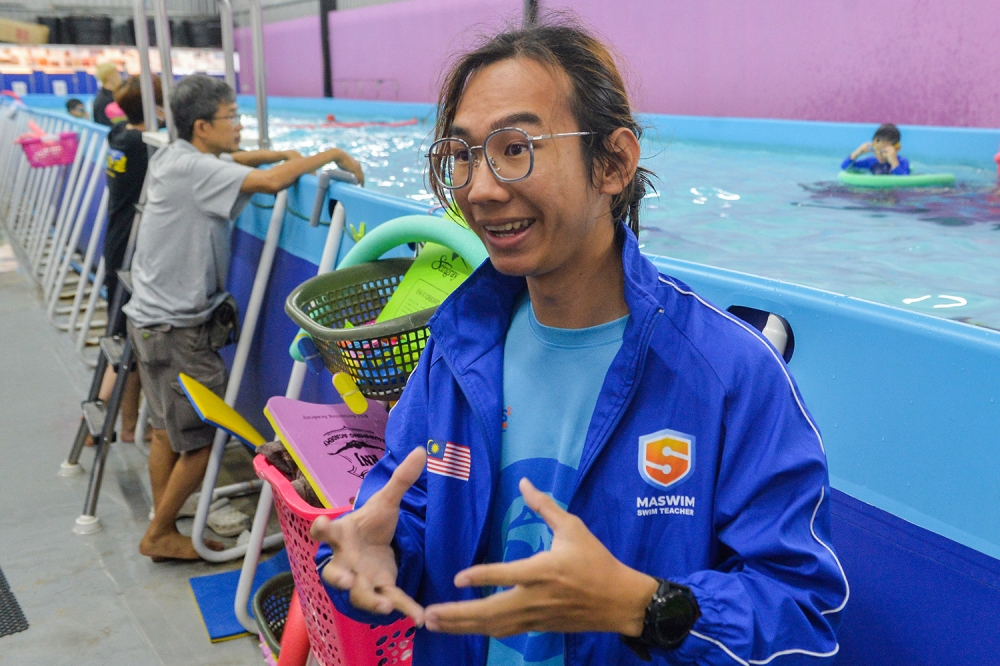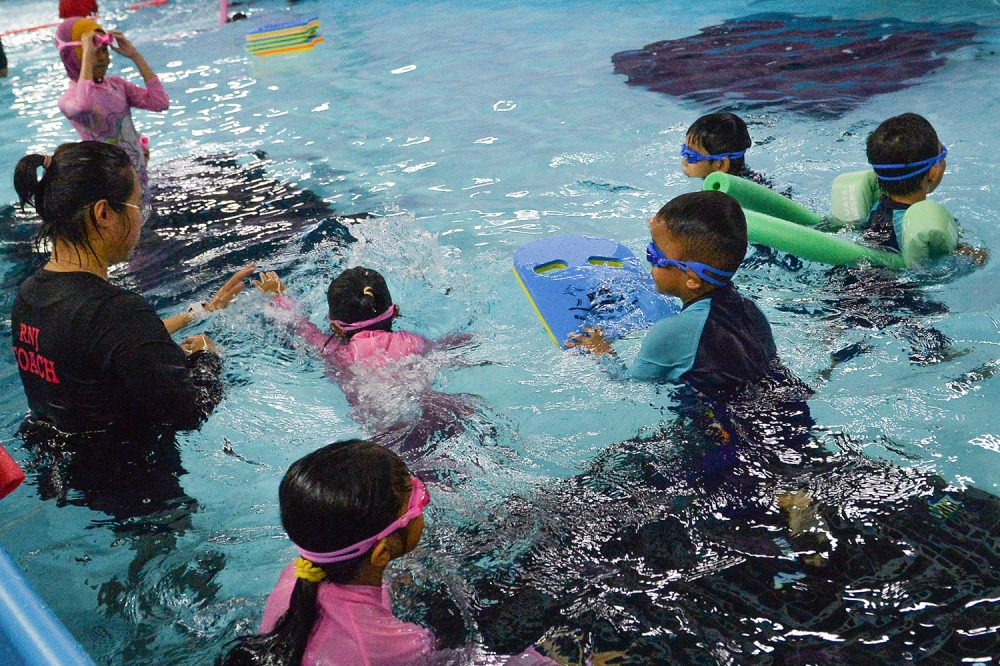PETALING JAYA, May 24 — After a few minutes of kicking and swinging his skinny arms awkwardly in the pool, Mohd Haras Iman, 7, broke a smile.
His blind mother, Fatin Nor Nabilah, 33, said it is something Haras rarely does. Haras is born with disability and speech impediment, which has made him extremely timid.
But since joining the Sports and Youth Ministry’s newly launched free swimming programme for children from low-income families a week ago, Haras has grown more confident. He is less shy around other children and shows more willingness to play.
Fatin believed the lessons have helped Haras develop self-esteem, likely because he has acquired some basic swimming skills. Before enrolling for the classes, Haras feared being in the water — which seemed to have reinforced the perception that he is different from other children. But now, he has learnt how to float.
“Before this, he was so afraid of water. If we went for a trip to the sea, he would just sit next to me,” the mother said.
“He’s taken three classes now and he’s already learned how to float. Before this, he had zero swimming ability. Now he’s showing signs of confidence and I think being around other kids helps.”
For poor parents like Fatin, the ministry’s free swimming classes — which is part of the Basic Sports Skills Training (KLAS) initiative — are more than just playtime for their children. It can be a matter of life and death.
Mitigating drowning cases among the poor
According to a study by the Perak Clinical Research Centre, some 500 people die from drowning annually and most of them are children, making drowning the second highest cause of death among those between the ages of 1 to 18.
Drowning is also one of the top five causes of death for young children in close to 50 countries, the World Health Organisation said in its report about the matter released in 2021.
Children from low-income families are especially more vulnerable. To the urban poor not living anywhere near water, the ability to swim is a privilege most cannot afford.
Hiring a swimming instructor can be expensive, with the average fee sometimes reaching up to RM300 an hour, making swimming lessons — and with it a crucial survival skill — only accessible to the upper classes.
And for heads of families with disabilities, usually the poorest of the poor, the fear of losing their children to drowning hits them harder. Fatin and her husband, Adnan, are both blind, which means guarding or saving Haras should he struggle in the water can be nearly impossible, or even life-threatening.

So when Sports and Youth Minister Hannah Yeoh launched the free swimming programme earlier this month, hundreds of low-waged parents like Fatin rushed to sign up their kids, knowing the initiative, even if small, could offer them hope to avert the tragedies that have broken so many other families.
“At least I can feel a bit relieved knowing Haras can float, that he won’t panic when he’s in the water,” Fatin said.
“Hopefully by the end of the class, he can already swim.”
Yeoh said at the launch of the swimming programme that her ministry aims to have 720 children from all over the country participate in the initiative, jointly headed by the Youth and Sports Department and the Swimmers and Swimming Coaches Association Malaysia (Maswim).
The programme’s primary goal is to “reduce” cases of drowning involving children. Lessons are free, with priorities given to children from low-income families who stay in low-cost federal housing flats.
Yeoh said the locations for the classes were picked based on the districts where cases of death by drowning are the highest, and her ministry has identified 18 districts of concern, spanning eight states: Kuala Lumpur, Selangor, Sabah, Sarawak, Kelantan, Kedah, Johor and Pahang.
In Selangor, the three districts with the highest rate of death by drowning are Gombak, Hulu Langat and Petaling, where Fatin and her family reside. Fatin said her family rents one of the units at the Lembah Subang 2 Public Housing Project (PPR).
Her son Haras is among 40 children from the low-cost public flats to have enrolled on the KLAS programme designated for the Petaling district.
The swimming lessons are carried out by trained instructors from RJN Swimming Academy, a private company, certified by Maswim. At the RJN Academy branch in Petaling Jaya, six swimming instructors are designated to train according to the age of their students.

Hanson Yan, the head instructor, said the classes are built around confidence-building before progressing to the freestyle technique, which instructors consider the best for survival swimming.
“It’s the fastest and easiest to learn because it teaches them to save themselves in case it gets tough [when swimming],” Yan told Malay Mail.
“I think the aim is by the sixth class we already help them build confidence at least, so they are comfortable being in the water...usually drowning happens when children panic.”
Each batch will undergo six free classes, the ministry said in an explainer of the programme, hoping that participants would have had some basic swimming abilities by the end of the programme.
How much longer can they swim for free?
However, whether or not that can be achieved with just six classes, each at just an hour and a half, remains to be seen. The number of hours a child needs to get decent at swimming can vary and depends on various factors like age and physical abilities.
According to articles by Australia’s Royal Life Saving Society senior research fellow Amy Peden and United Kingdom-based trainer Swim Now UK, a child may need up to 20 to 25 hours of lessons before they develop enough skills to swim competently.
Muhammad Izhar Ahmad Shapie, who chairs the residents’ committee of block C in the Lembah Subang 2 PPR, had three of his four children enrolled for KLAS. After the fourth class today, he felt they have shown progress but still felt they needed more lessons.
“I think this is a very good initiative and I can see my children love it. From not knowing how to swim now they can float. Still, I think the lessons are short and if the minister can, she should try to lengthen the classes,” he said.
“We all hope our children can learn to be good swimmers from this.”

Also, cost could be an issue. Despite youths making up nearly a third of the country’s over 32 million population and almost half the current electorate, Yeoh’s ministry received among the lowest allocation under Budget 2023, just RM374 million.
The ministry is paying RM395,800 to run the free swimming lessons. Yeoh told Malay Mail it is possible they would continue the programme if the enrollment rate is positive.
Yan, who felt the programme was fulfilling because it gave him a chance to help poor children, also called for the programme to be continued but suggested that lessons are charged at a very cheap rate, maybe subsidised by the ministry.
“It is like an honour for me,” he said. “I enjoy it because I get to teach so many kids and I can see they also really enjoy it.”





















